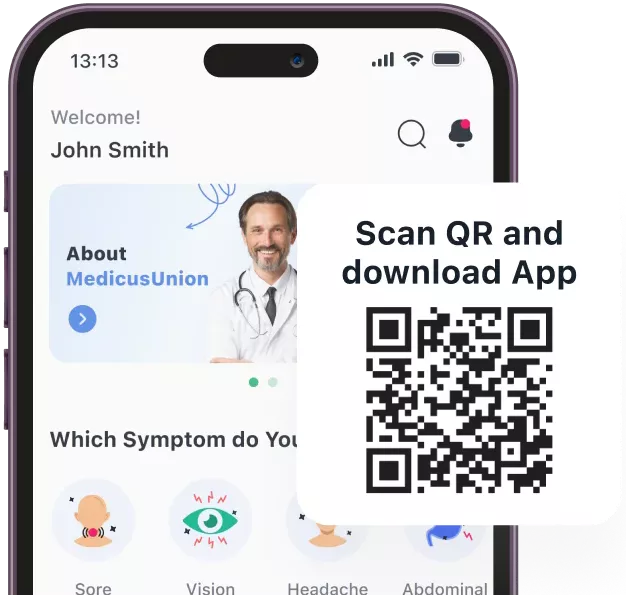English
Русский
Deutsch
.jpg?size=600)
The Recovery After Laparoscopic Surgery: Essential Tips
MedicusUnion Team
November 09, 2023
5 min. read
Dive into our latest blog article for essential tips on bouncing back after laparoscopic surgery. From dietary advice to emotional support, discover the keys to a smooth and speedy recovery.
Laparoscopic surgery is a minimally invasive surgical approach commonly employed in the abdominal and pelvic regions. This technique relies on the use of a laparoscope, a slender, telescopic instrument equipped with a camera at its tip. Its key advantage is the ability to visualize the interior of the body without the need for a full-scale incision. Instead of the sizable 6- to 12-inch cut associated with traditional open abdominal surgery, laparoscopic surgery employs two to four small incisions, each measuring half an inch or less in length. Among medical professionals, it is often referred to as "keyhole surgery," owing to these petite access points. In this article, we will explore some essential tips to help you recover after laparoscopic surgery and get back to your daily life as quickly as possible.
When Laparoscopy is Used
Laparoscopy is a valuable diagnostic tool that allows for the direct examination of the body's internal structures when non-invasive methods like ultrasound, CT scans, or MRI scans are insufficient for confirming a diagnosis. It is commonly employed in various medical scenarios, including:
- Diagnosing pelvic conditions like pelvic inflammatory disease (PID), endometriosis, ectopic pregnancy, ovarian cysts, fibroids, female infertility, and unexplained pelvic or abdominal pain.
- Assessing undescended testicles in pediatric cases, where one or both testicles have not descended into the scrotum at birth.
- Investigating acute conditions like appendicitis, a painful inflammation of the appendix.
Moreover, laparoscopy can play a crucial role in cancer diagnosis by obtaining tissue samples for biopsy. It is a valuable tool in diagnosing cancers such as liver, pancreatic, ovarian, bile duct, and gallbladder cancer.
How to Recover after a Laparoscopic Surgery?
Recovery from laparoscopic surgery varies from person to person and is influenced by several factors. These factors include the individual patient's expectations, the complexity of the surgery, the duration of the procedure, the skill of the surgeon, and the quality of the medical facility.
However, due to the small incisions, the recovery time is relatively fast. Most patients can return to their normal activities as soon as one week after surgery. Postoperative pain resolves within a few days, and scarring is minimized. What are the important aspects to consider in order to ensure that the recovery is as quick and smooth as possible?
Following Doctor's Instructions
The first and most important step in your recovery journey is to follow your doctor's instructions meticulously. Your surgeon will provide you with specific guidelines for your recovery, including post-operative medications, dietary restrictions, and activity limitations. These guidelines are tailored to your unique situation and are designed to optimize your healing process.
Time For Recovery Period
Having a proper postoperative recovery period is essential. The exact length of recovery can vary depending on how complex the procedure was, but it usually falls somewhere between 2 to 6 weeks. There might be situations where you need even more time to recover, and your doctor will discuss it with you.
You should notice things getting better bit by bit each day in terms of how you feel after the surgery.
Light But Nutritious Diet
Optimal choices include smoothies, protein shakes, broths, and liquid nourishment, as these options are gentler on your digestive system. It is crucial to maintain proper hydration during the recovery period. Initially, you should avoid foods that are more difficult to digest e.g. high fiber foods or foods that create a lot of gas.
Anesthesia and certain pain medications after surgery cause constipation. Don't expect an immediate bowel movement right after the procedure. Instead of resorting to laxatives, suppositories, or enemas, it's generally better to let your natural bowel function gradually return. You can typically resume a regular diet after the first few days following surgery or once your bowel movements have normalized.
Over the long term, your doctor may also recommend switching to an anti-inflammatory diet to minimize potential symptom flareups.
Incision Care
Most surgical stitches are designed to naturally dissolve within a span of 2 to 6 weeks, eliminating the need for manual removal. Your physician will tell you if there's a necessity for in-office stitch removal.
It's essential to ensure that the skin areas around the stitches are free from irritation caused by clothing or any other materials. While you are permitted to take showers, you should avoid soaking the incision areas in water for 4 to 6 weeks. Be gentle while showering and keep it dry and clean to minimize the risk of infection.
Support
Rely on the emotional and practical support of your family and friends during your recovery. Don't hesitate to ask them for assistance with daily tasks and to accompany you to medical appointments. Having someone to talk to and assist you during your recovery can make a significant difference in your overall well-being.
Conclusion
Recovery after laparoscopic surgery can be a manageable and relatively smooth process when you follow these essential tips. However, it's important to remember that every patient's experience is unique, so always consult with your healthcare provider for personalized guidance.
If you have questions or concerns about your recovery, or if you're considering laparoscopic surgery and want to consult with a medical professional, MedicusUnion is here to help. Our platform offers convenient and secure online consultations with high-ranking European doctors, allowing you to connect with experienced healthcare providers from the comfort of your own home. Don't hesitate to reach out to MedicusUnion for expert guidance and support during your recovery journey.

Get the MedicusUnion App!
- Certified Doctors
- Video consultation with a doctor
- Simultaneous interpreter during consultations